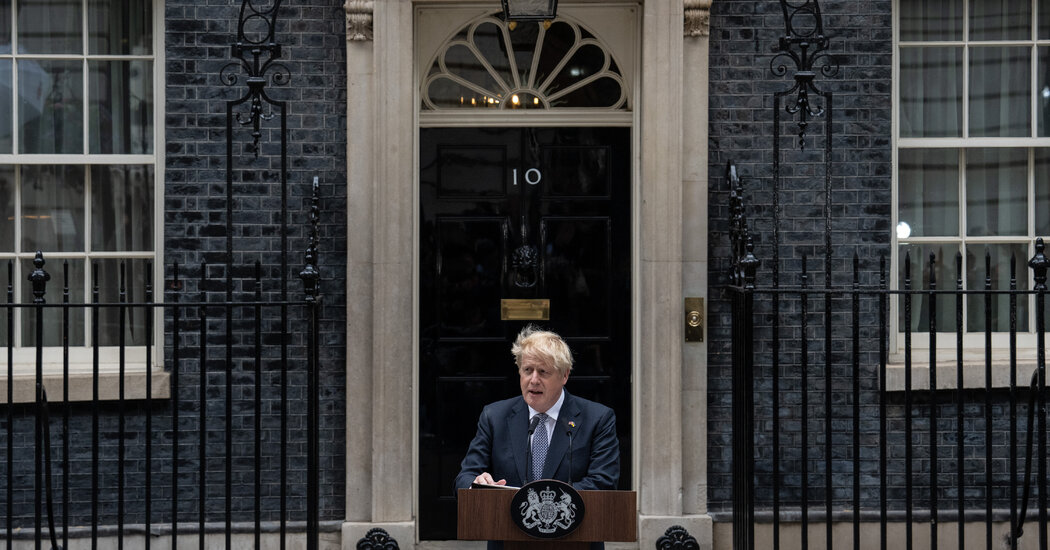Gentle Into That Good Night? Not Boris Johnson.

LONDON — Less than three weeks after he announced his resignation, and with rumors already swirling that he plans a comeback, Britain’s scandal-scarred prime minister, Boris Johnson, received the sort of self-care advice best dispensed by a family member.
“If you ask me,” Rachel Johnson, the prime minister’s sister, said recently on LBC Radio, where she hosts a talk show, “I would like to see my brother rest and write and paint and just regroup and just, you know, see what happens.”
Not much chance of that.
Still serving as caretaker prime minister, Mr. Johnson has hardly retreated to the background. He recently posed in a fighter jet, then at a military base where he hurled a hand grenade, used a machine gun and held a rocket launcher during a training exercise with Ukrainian troops.
According to one media report, he stoked speculation that somehow he might try to reverse his resignation, lunching recently with a prominent supporter of a petition for a rule change that could allow him to remain in his job.
And at his final appearance in Parliament as prime minister, Mr. Johnson’s verdict on his three tumultuous years in Downing Street was “mission largely accomplished — for now,” before he signed off with words from a “Terminator” movie: “Hasta la vista, baby.”
Mr. Johnson, 58, lost his job when a succession of scandals prompted dozens of resignations from his government but he remains prime minister until early September when one of the two remaining candidates — Foreign Secretary Liz Truss or the former chancellor of the Exchequer, Rishi Sunak — will take over. In politics the media caravan moves swiftly on, and a vicious battle for the succession is now the big news story.
Yet as a devotee of the Terminator franchise, Mr. Johnson knows about sequels.
“He’s not the kind of person who gives up and goes away to live a quiet life in some nice house in the country and does good work for the local church,” said Andrew Gimson, who is soon to publish a second volume of his biography of Mr. Johnson.
“You don’t really get to the top unless you are already quite unnaturally competitive, so it would be very astonishing if he just subsided into private life.”
The Fall of Boris Johnson, Explained
Turmoil at Downing Street. Britain’s prime minister Boris Johnson said he would step down less than three years after a landslide election victory, following a series of scandals that have ensnared his government. Here’s what led to this:
The Pincher case. Mr. Johnson’s downfall is connected with the resignation of Chris Pincher, a Conservative deputy chief whip, after he admitted to having groped two men. Outrage grew as it was revealed that Mr. Johnson was aware of prior sexual misconduct allegations against him when he appointed him; the prime minister had previously denied knowing about the accusations.
A wave of resignations. The revelations prompted the unexpected resignation of two of Mr. Johnson’s highest-ranking ministers — the chancellor of the Exchequer, Rishi Sunak, and the health secretary, Sajid Javid. That was followed by a flurry of resignations of other ministers and officials, capped by Mr. Johnson’s decision to step down.
The ‘Partygate’ scandal. Since late last year, Mr. Johnson had been grappling with reports about parties he attended in Downing Street while Covid lockdown rules were in force. An internal inquiry found that 83 people violated the rules at parties, and the police imposed hundreds of fines, including one on Mr. Johnson, for breaches of social distancing. Mr. Johnson survived a no-confidence vote triggered by the scandal, but was left reeling politically.
Other scandals. The prime minister’s reputation had also been tarnished by his staunch defense of a Conservative lawmaker for violating lobbying rules, his government’s contentious plans to change the system that investigated that lawmaker and the costly refurbishment of his apartment at No. 10 Downing Street, for which he secretly used funds from a Conservative Party donor.
While a return to Downing Street may be unlikely, Mr. Johnson, with his outsize political profile, knows how to keep his name in the headlines. That may not be good news for his successor.
Writing in The Times of London, William Hague, a former Conservative leader, warned of the potential for Mr. Johnson to articulate “a bundle of resentment, denial, attention-seeking and attempted vindication that will be a permanent nightmare for the new prime minister.”
Downing Street is not saying anything publicly about Mr. Johnson’s future though his allies reject Mr. Hague’s comments. They expect Mr. Johnson to remain in Parliament and to speak out over any dilution of his strong commitment to Ukraine, any significant shift over Brexit or a reversal of his still cloudy plan to “level up” the prosperity of neglected regions.
Despite the scandals that led to his resignation, he retains a strong coterie of supporters in the right-wing media and among his party members who will elect the new leader. Backers of Ms. Truss have tried to exploit this loyalty, and have accused Mr. Sunak — whose resignation started the unraveling of Mr. Johnson’s job security — of betraying the prime minister. One cabinet minister, Nadine Dorries, recently retweeted an image of Mr. Sunak in the pose of Brutus about to stab Julius Caesar in the back.
And a seemingly doomed campaign to keep Mr. Johnson in Downing Street via a petition, signed by thousands of Conservative Party members, helps validate his theory — advanced when he announced his resignation — that his lawmakers acted irrationally in forcing out the man who brought them victory in 2019.
“As we have seen at Westminster the herd instinct is powerful and when the herd moves, it moves,” Mr. Johnson said in his resignation speech, suggesting that his Conservative colleagues in Parliament were simply succumbing to the political survival instinct of following the crowd.
Mr. Johnson expressed very little remorse or self-reflection on the mostly self-inflicted wounds that led to his downfall.
Robert Ford, a professor of political science at the University of Manchester, said that the prime minister may believe in his heart that it is possible for him to some day return to Downing Street because he has defied the odds before.
“All his political life he has believed he is someone special, that he can achieve things others can’t and is someone to whom the normal rules don’t apply,” he said, noting Mr. Johnson’s numerous comebacks from previous reverses.
Professor Ford said that comparisons to former President Donald J. Trump are inexact because Mr. Johnson ultimately accepted the process that ousted him.
“But where the Trump analogy applies is: first, in Boris Johnson rejecting the idea that anything that happened this year is his fault; and second in his very intense desire to have the spotlight back on him,” Professor Ford said.
Any remaining political ambitions aside, Mr. Johnson is not short of options to make a living. He has a biography of William Shakespeare to complete, the prospect of lucrative appearances on the international lecture circuit and even, potentially, the lure of journalism. (He is a former columnist for The Daily Telegraph).
Twice divorced, Mr. Johnson has two young children with his wife, Carrie Johnson, and another five from previous relationships. It is unclear where he and his wife will live once they leave Downing Street because, according to British media reports, their properties in London and Oxfordshire were rented on the assumption that they would have an official home for years.
If he is to remain a force in politics, the first task for Mr. Johnson will be to hold on to his seat in Parliament.
The Political Situation in Britain
After getting ensnared in various scandals, Boris Johnson said he would step down as prime minister of Britain, clearing the way for a new leadership race inside the Conservative Party.
- Johnson’s Lies: The British prime minister thought he could swagger his way through any scandal, but his cavalier attitude toward the truth brought an end to his tumultuous tenure.
- A Test for the Tories: Mr. Johnson’s departure from office poses great challenges for the governing Conservatives called to replace him against a dire economic backdrop.
- Leadership Race: The selection of Mr. Johnson’s replacement is in the hands of Conservative lawmakers. Here is our guide to the process.
- Final Candidates: Rishi Sunak and Liz Truss emerged as the last two contenders vying to lead Britain. In making their pitch to voters, they have both drawn inspiration from Margaret Thatcher.
A committee is investigating whether he misled lawmakers over lockdown-breaking parties in Downing Street and, if it goes badly for Mr. Johnson, he could have to fight an election to keep his seat later this year.
Nor is it certain he would hold his seat at the next general election unless fortunes improve for his Conservatives, so there is speculation that he might search for a safer district.
As for an eventual return to Downing Street, Mr. Gimson said that Mr. Johnson’s “greatest chance of coming back is if the nation is in a desperate predicament and he is thought to be the only figure big enough and bold enough to deal with it.”
Some previous prime ministers have made comebacks, including Winston Churchill, Mr. Johnson’s political hero.
But Mr. Johnson’s task would be harder because — unlike Churchill — he has lost the leadership of the Conservative Party, and would have to won it back before any second attempt at Downing Street. It seems unlikely that Conservative lawmakers would want to risk a repetition of his chaotic administration.
In any event, said Professor Ford, with a ready platform in the right-wing media, Mr. Johnson is more likely to relish troublemaking than playing the supportive elder statesman.
“He doesn’t accept personal responsibility for his ouster, and he doesn’t think he should have gone,” Professor Ford said. “He does think that he has a mandate from the people and a special electoral appeal that his colleagues cannot replicate.”
And the question remains: deep down, does Mr. Johnson — who has a long history of being written off only to disprove his doubters — acknowledge that this time it’s really all over?
“I doubt it,” said Mr. Gimson, his biographer, “I think he’s accepted that he’s out in the short term. But that’s the short term, and he’s an optimist by nature.”




